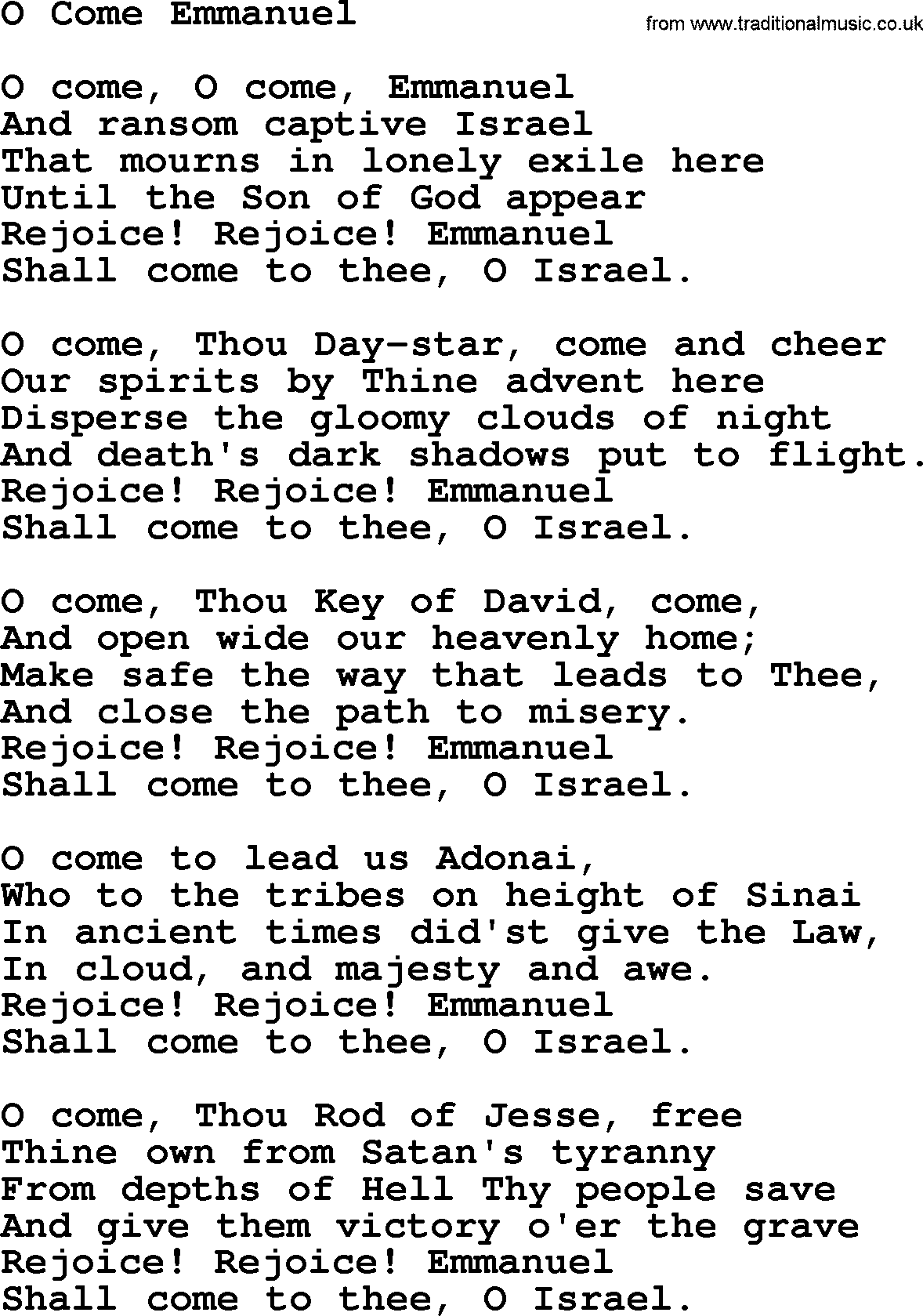Welcome to this post where we will be discussing one of the most beautiful hymns that is sung during the Advent season, “O Come Emmanuel”. This hymn is a favorite among many Catholics and Christians around the world, and today we will explore the history behind it and its powerful lyrics. So let’s dive right in!
History of “O Come Emmanuel”
“O Come Emmanuel” is a hymn that has been around for centuries. The origins of the hymn are traced back to the 8th century, in the form of a Latin chant. The original text of the chant was “Veni, Veni, Emmanuel” with the English translation being “O come, O come, Emmanuel”.
The hymn was originally sung during the “O” Antiphons, which are part of the Liturgy of the Hours during the period of Advent. The “O” Antiphons have been sung since the 5th century and each one begins with the word “O”, followed by a different title of Jesus, such as “O Wisdom”, “O Adonai”, “O Root of Jesse”, etc. These antiphons are recited or sung during the week before Christmas or “the octave of Christmas” (December 17-23).
It wasn’t until the 19th century that the hymn gained popularity in English-speaking countries. The English translation we know today was done by John Mason Neale, an Anglican priest, in 1851. He was known for his translations of ancient hymns and his contribution to preserving traditional church music.
The Lyrics of “O Come Emmanuel”
The lyrics of “O Come Emmanuel” are powerful and meaningful, as they express the longing and anticipation for the coming of the Messiah. The hymn is a reminder of the hope and joy that the birth of Jesus brings to the world. Let’s take a look at the lyrics:
 The Meaning Behind the Lyrics
The Meaning Behind the Lyrics
Each verse of the hymn focuses on a different title of Jesus and the significance of His birth. Let’s delve deeper into the meaning behind the lyrics:
“O Come, O Come, Emmanuel”
This verse expresses the longing for the coming of the Messiah, as Israel waited for the fulfillment of the prophecies that promised a Savior. The word “Emmanuel” means “God with us”, which is a reminder that Jesus came down to earth to be with His people and bring salvation.
“O Come, Thou Wisdom”
This verse acknowledges Jesus as the source of all wisdom and knowledge, as it says “Come and teach us the way of prudence”. It also goes on to refer to Jesus as the “key of David”, a reference to the prophecy in the book of Isaiah that spoke of a key that would unlock the gates of heaven.
“O Come, Thou Rod of Jesse”
This verse speaks of Jesus’ lineage, as he was a descendant of Jesse, the father of King David. It recognizes Jesus as the fulfillment of the prophecy that promised a king who would come from the line of David.
“O Come, Thou Dayspring”
This verse speaks of Jesus’ light and his role in dispelling darkness in the world. It refers to Jesus as the “Dayspring”, which means the “rising sun” or the “dawn”. This is a reference to the prophecy in the book of Malachi that speaks of the “sun of righteousness” who will dawn with healing in his wings.
“O Come, Thou Key of David”
This verse refers to Jesus as the one who has the power to open the gates of heaven, as the key of David symbolizes authority. It acknowledges Jesus as the one who holds the power to free His people from bondage and to save them from their sins.
“O Come, Thou King of Nations”
This verse speaks of Jesus as the ruler of all nations and the one who brings unity and peace to the world. It recognizes Jesus as the one who came to break down the barriers between people and to reconcile them to God.
“O Come, O Come, Emmanuel”
This final verse repeats the opening verse, reminding us once again of the longing and anticipation for the coming of Jesus.
Conclusion
“O Come Emmanuel” is a hymn that speaks of the hope and joy that Jesus brings to the world. Its lyrics are a reminder of the significance of His birth and the fulfillment of the prophecies that promised His coming. As we prepare for the Advent season and Christmas, let us remember the meaning behind this beautiful hymn and the message that it brings.